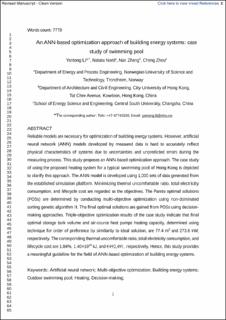An ANN-based optimization approach of building energy systems: Case study of swimming pool
Peer reviewed, Journal article
Accepted version

Åpne
Permanent lenke
https://hdl.handle.net/11250/2733531Utgivelsesdato
2020Metadata
Vis full innførselSamlinger
Sammendrag
Reliable models are necessary for optimization of building energy systems. However, artificial neural network (ANN) models developed by measured data is hard to accurately reflect physical characteristics of systems due to uncertainties and unpredicted errors during the measuring process. This study proposes an ANN-based optimization approach. The case study of using the proposed heating system for a typical swimming pool of Hong Kong is depicted to clarify this approach. The ANN model is developed using 1,000 sets of data generated from the established simulation platform. Minimizing thermal uncomfortable ratio, total electricity consumption, and lifecycle cost are regarded as the objectives. The Pareto optimal solutions (POSs) are determined by conducting multi-objective optimization using non-dominated sorting genetic algorithm II. The final optimal solutions are gained from POSs using decision-making approaches. Triple-objective optimization results of the case study indicate that final optimal storage tank volume and air-source heat pumps heating capacity, determined using technique for order of preference by similarity to ideal solution, are 77.4 m3 and 273.6 kW, respectively. The corresponding thermal uncomfortable ratio, total electricity consumption, and lifecycle cost are 1.84%, 1.40 × 1010 kJ, and €492,491, respectively. Hence, this study provides a meaningful guideline for the field of ANN-based optimization of building energy systems.
